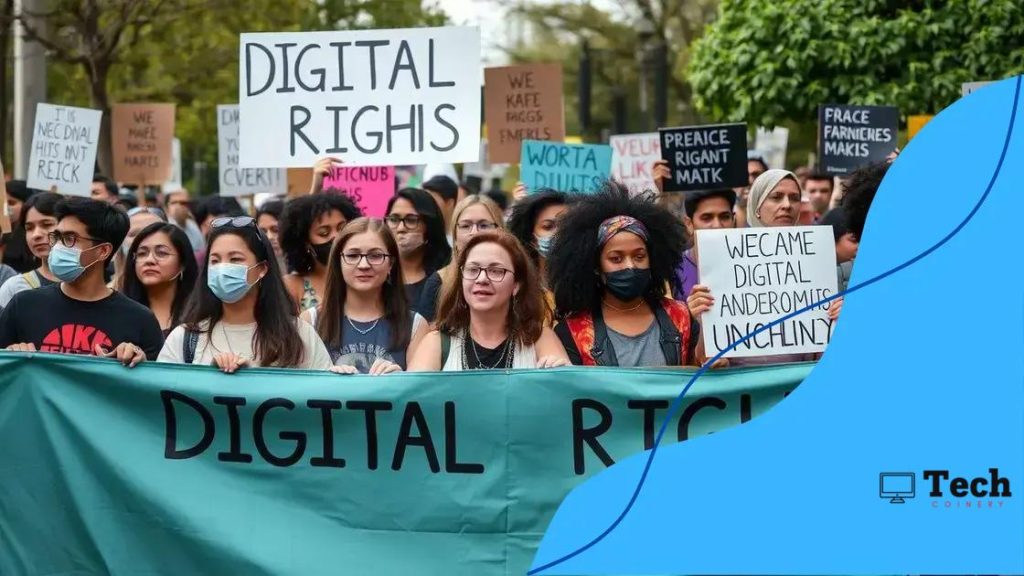National digital rights marches: a call for action

National digital rights marches mobilize individuals to advocate for the protection of online freedoms, pushing for legislative changes and raising awareness about critical issues like data privacy and freedom of expression.
National digital rights marches are gaining momentum as advocates rally for digital freedoms and protection. Have you ever wondered how these movements shape our online rights? Let’s dive in to explore their significance and impact.
Understanding national digital rights marches
Understanding national digital rights marches is crucial in today’s digital landscape. These events bring people together to advocate for the protection of our online freedoms. They highlight the importance of maintaining our rights in an increasingly digital world.
As technology evolves, so do the challenges we face regarding our personal data and privacy. Recognizing the core issues addressed during these marches can empower individuals to engage in meaningful actions.
Key Themes of the Marches
Understanding the major themes helps explain the urgency behind these movements. Here are some vital points:
- Data privacy protections are critical in safeguarding individual rights.
- Access to information aligns with the principles of freedom of speech.
- Ensuring equal digital access for all communities promotes inclusivity.
- Advocating for stronger regulations on tech companies can prevent abuses.
Marches provide a platform for voices that might otherwise go unheard. Participants use their stories to personalize the struggle for digital rights, thus fostering a collective understanding. For instance, sharing experiences with data breaches illustrates the need for stronger privacy laws. Such storytelling is compelling and energizes the calls for change.
Moreover, these events often unite diverse groups around a common goal. From privacy advocates to tech experts, everyone plays a role in advocating for justice in the digital realm. By collaborating, they can amplify their impact and reach broader audiences.
Key issues addressed during the marches
The key issues addressed during the marches are vital for understanding why these events matter. People come together to raise their voices against practices that threaten our digital rights. Key concerns include privacy, freedom of expression, and the regulation of technology.
Privacy Concerns
As our lives become more digital, privacy becomes a pressing issue. Marchers often focus on protecting personal data. With frequent data breaches and misuse of information, individuals feel vulnerable and demand stronger measures to secure their online identities.
- Demands for stricter data protection laws.
- Calls for transparency from tech companies regarding data usage.
- Advocacy for the right to delete personal information.
Furthermore, participants share their stories about how their data has been misused, creating a powerful narrative that resonates with many. These personal experiences not only highlight the urgency of the issue but also motivate others to join the fight.
Freedom of Expression
Another critical topic is the freedom of expression. In today’s digital world, the right to voice opinions online is essential. Marchers advocate against censorship and for platforms that allow free speech.
- Opposition to content filters that limit free expression.
- Support for legislation protecting digital speech.
- Awareness about the dangers of online harassment.
This issue, like privacy, invokes strong feelings among participants, leading to passionate discussions about what it means to be free in a digital society. Activists remind us that protecting our voices online is just as important as protecting them offline.
Additionally, the regulation of technology plays a significant role in the conversations during these marches. Participants demand laws that hold tech companies accountable for their actions. The rise of artificial intelligence and data mining raises ethical questions that cannot be ignored.
Efforts to improve AI regulation are highlighted, aiming to prevent biased algorithms that can discriminate against individuals. By addressing these issues, marchers advocate for a future where technology serves humanity without infringing on our rights.
Impact of national digital rights marches on legislation

The impact of national digital rights marches on legislation is significant and multifaceted. These events mobilize communities to advocate for changes in laws that protect digital freedoms. As people gather to express their concerns, lawmakers take notice of the growing demand for enhanced protections.
One evident effect of these marches is the introduction of new legislation aimed at safeguarding our digital rights. Policymakers often feel the pressure to respond to the voices of concerned citizens. When large groups demand action, it creates a sense of urgency that cannot be ignored.
Influencing Policy Changes
Marches push for specific policies that address key issues. Activists advocate for:
- Stricter privacy regulations to protect personal data.
- Stronger penalties for data breaches and misuse of information.
- Measures that promote transparency and accountability in tech companies.
When these issues are raised in the public sphere, legislators often feel motivated to draft bills that reflect the needs of their constituents. As a result, we see a shift towards more robust digital rights frameworks.
Real-World Examples
There have been notable instances where marches directly influenced legislation. For example, after major digital rights rallies, certain countries introduced laws that protect consumer privacy and hold companies accountable for data handling practices. These changes are a testament to the power of collective action.
Furthermore, the coverage of these marches often brings attention to digital rights issues on a wider scale. News reports shine a spotlight on the challenges people face, leading to broader public discussions. This increase in awareness can prompt legislators to prioritize digital rights.
In many cases, grassroots movements emerge from these marches. Local organizations may form with a goal of creating advocacy groups focused on specific legislative goals. This grassroots approach empowers citizens, allowing them to engage directly in the political process. It can lead to sustained pressure on lawmakers to act.
Personal stories from participants in the marches
The personal stories from participants in the marches add a powerful dimension to the movement for digital rights. Each individual’s experience sheds light on the real-life implications of digital policies and the importance of advocacy. These narratives emphasize that this fight is not just about legislation but profoundly affects everyday people.
Many participants share their own encounters with privacy violations. For instance, some talk about how their personal information was mishandled by companies, leading to identity theft or harassment. These compelling stories resonate with the audience, as they showcase the dangers of inadequate digital protections.
Voices of the Affected
Hearing firsthand accounts allows the community to understand the urgency behind the marches. Participants often say:
- “I had my identity stolen because a company did not protect my data.”
- “Censorship made it hard for me to express my opinions online.”
- “I worry every day about my personal information being used against me.”
These statements highlight the emotional impact of privacy violations and censorship. When individuals share their struggles, it deepens the collective resolve to advocate for change.
Building a Sense of Community
Moreover, these stories build a sense of community among participants. When people come together and share their experiences, it fosters connections that strengthen the movement. Many marchers find reassurance in knowing they are not alone in their struggles. This support network encourages others to speak out and advocate for digital rights.
Activists often describe how sharing their stories helped them realize the importance of fighting for digital freedom. It ignites a passion for protecting others, especially those who might not have a platform to speak. These personal accounts amplify the message of solidarity, driving home the need for collective action.
How you can get involved in future marches
Getting involved in future marches for digital rights is an empowering way to make your voice heard. There are various ways that individuals can contribute and participate in these important events. Each person plays a crucial role in advocating for change that affects everyone.
One of the best ways to start is to keep informed about upcoming events. Many organizations use social media and websites to announce marches. Following relevant groups can provide valuable updates. Additionally, signing up for newsletters can ensure you don’t miss any announcements. Being aware of the timelines helps you prepare to join.
Participate Actively
When you decide to attend a march, consider bringing signs that highlight key issues. Effective slogans on your sign can capture attention and communicate your message clearly. Some suggestions for messages include:
- “Protect my privacy!”
- “Censorship is not freedom!”
- “We need digital rights for all!”
Joining a group or community can also enhance your experience. Marching with others who share your passion creates a sense of solidarity. Local activist groups often organize meetups to plan logistics and share resources. These gatherings can be a great opportunity to connect with like-minded individuals.
Volunteer Your Skills
If you have specific skills, consider volunteering. Whether you are good at organizing, graphic design, or social media outreach, your skills can contribute greatly. Organizations often need volunteers to manage events, spread awareness, and engage with participants. Your involvement can help amplify the movement’s message.
Beyond attending marches, you can also advocate for digital rights within your community. Hosting discussions or workshops can raise awareness about the importance of digital freedoms. Encourage others to learn and speak out about their rights, fostering an informed community dedicated to protecting these values.
Lastly, connecting with policymakers is essential. Writing to your local representatives about digital rights issues can influence legislation. Sharing your concerns ensures that elected officials understand the public’s demand for change. Your voice matters in this ongoing dialogue.
FAQ – National Digital Rights Marches
What are national digital rights marches?
National digital rights marches are public demonstrations where people advocate for the protection of online freedoms and digital rights.
How can I participate in these marches?
You can participate by attending the marches, spreading awareness, volunteering your skills, and contacting lawmakers about digital rights.
Why are personal stories important in these marches?
Personal stories highlight the real impact of digital policies, helping to motivate others and foster a sense of community among participants.
What impact do marches have on legislation?
Marches increase public awareness and pressure lawmakers to introduce or amend legislation that protects digital rights.






